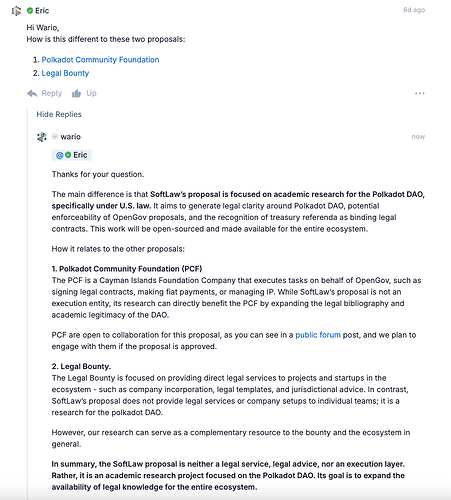gm Polkadot Community!
I have a potential treasury proposal and I would love to receive some feedback first.
Thanks.
Proposer:
SOFTLAW S.A. DE C.V.
A legaltech company focused on the evolution of the Law.
Github: soft.law · GitHub
Problem Statement:
The Polkadot ecosystem is growing and currently lacks a formal presence in the United States, weakening both its credibility and capacity to scale public goods and services.
This legal deficiency constrains a) DAO agents and bounties to enter into enforceable agreements with Banks, Corporations, Institutions, and Governments. b) Formal Recognition of Treasury Proposals as enforceable contracts.
Proposal Summary:
This proposal seeks funding to conduct a 6-month research and development of the initial phase of Polkadot.law, which includes a) Polkadot DAO Governance System Research under US Law; b) Engagement with Ecosystem Agents, c) Landing Page Development.
Polkadot.law will serve as a neutral, public good.
The research will attend 3 main topics:
1. Legal Analysis of DAO Structures: Examination of legal entities available under U.S. law that could be used to incorporate the Polkadot DAO.
2. Recognition of Treasury Proposals as Legal Agreements: Legal assessment of treasury proposals as enforceable contracts. This includes the potential incorporation of Alternative Dispute Resolution (ADR) mechanisms, such as ICC arbitration clauses, and a legal framework to address cases where treasury-funded deliverables are not fulfilled.
3. Commercial Use Cases and Contract Drafting: Legal analysis of three core commercial activities (KOL & Marketing Services Agreement, IRL Events Services Agreement, Software Development Agreement) within the Polkadot ecosystem and delivery of three contract templates under international private law.
The principal objective is to articulate a legal strategy for protecting public goods within the Polkadot ecosystem and ensuring referenda and treasury actions can be treated, where appropriate, as legally binding agreements.
Deliverables:
1. Analysis of the Polkadot DAO under US Law.
2. Landing Page for Polkadot.law
Publication and Licensing:
The final report will be published under an open license and made available through: The domain www.polkadot.law and as a public comment in the respective on-chain referenda discussion
Optional Follow-up (Not included in this proposal):
- A DAO incorporation framework and internal governance design.
- A legal documentation toolkit and interactive legal resource hub.
- Tax Analysis.
- Legaltech Dapp.
These potential future efforts will be pursued only upon further consultation with the community and the evaluation of the present report.
Timeline
The work will be structured over a total period of six months.
Alignment with the Polkadot Ecosystem
This proposal supports the Polkadot ecosystem’s commitment to decentralized governance, public goods funding, and neutrality.
Budget
$50,000
Contact:
wario@soft.law
@wario_mx:matrix.org
